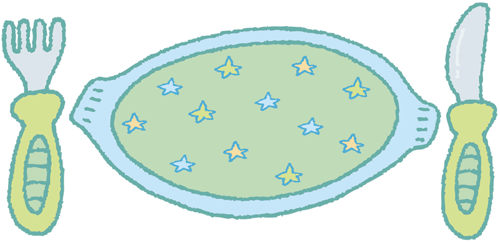Over the coming months, your child will begin to develop the skills, confidence, and understanding necessary to establish independent eating habits and, of course, table manners. It can be a slow process, but with reassurance and guidance, your child will soon be a polite and self-sufficient regular at the family table.
| Q: |
My toddler just chats and plays games at the table, rather than eating. What should I do?
| | A: |
Rather that offering an unlimited mealtime, limit it to 20
minutes, after which first courses are taken away, and, desserts (if
appropriate) are offered. Also, try to eat as a family, so she can
witness how other people behave at the table. Ultimately, if she chooses
to play rather than eat, she’ll be hungry—it won’t take her too long to
learn that this gets her nowhere.
|
| Q: |
What’s the best way to teach children how to use a knife and fork?
| | A: |
First of all, choose cutlery designed for little hands and
fingers, which are much more manageable. Sit down with your child at
mealtimes so she sees how you operate your cutlery. Little ones learn a
great deal by copying, and through example, so it’s important that you
exhibit the table manners you want to see. If her siblings pick up their
food, and scoop things up with a spoon rather than using a knife and
fork, your child is unlikely to do things any differently.
If she’s not too
independent, try to feed her some of the time, and then allow her to
feed herself. She’ll watch the way you spear food with a fork, or use a
(blunt) knife to push food onto her fork. She’ll see how to negotiate a
spoon, and how to turn it to get it into her mouth. Don’t worry too much
though; it can take little ones months or even years to develop these
skills successfully, and to become independent eaters.
Offering some finger
food as part of meals can help to encourage hand-eye coordination, and
reinforce the concept of getting food from plate to mouth. It also helps
to ensure that she gets something in her tummy by the end of the meal.
|
| Q: |
My toddler has tantrums every night at the dinner table; how should I cope with them?
| | A: |
Very simply, by ignoring them. As with all tantrums, a child who
gets no response will soon see that he needs to adopt a better method.
The main reason that toddlers choose to misbehave at mealtimes is
because they know that they are bound to get a reaction. You care what
they eat, and you mind if they don’t eat. What better way to wield an
emotional weapon than to hit you where it really hurts! If mealtimes are
devoid of emotional charge—in fact, pleasurable and fun—your toddler
will not only enjoy them, but soon see that the tantrums have no impact,
and, in fact, ruin the fun!
If the tantrums do
start, lift him down, don’t offer an alternative meal, and try not to
lose your temper. You can also help to diffuse the situation by offering
some choices in advance, so he feels that he’s in control to some
extent .
|
| Q: |
How can I encourage my child to stop getting up and down from the table?
| | A: |
First of all, when you move your child on to a family chair, make
it clear that she is expected to sit until her meal is finished. This
isn’t a draconian suggestion that she sits there for hours until her
plate is empty, but that she does not leave until she is finished. You
can catch her and return her to her seat when she escapes, or you can
simply remove her meal, so that she learns that leaving the table means
that the mealtime is finished, and that there is no more offered. It
might take a couple of hungry evenings for the message to sink in, but
it will eventually. Try to encourage her to ask before getting down,
which will make life much easier in future.
|
| Q: |
My toddler still makes a mess when he eats; how can I encourage him to be neater, or does it really matter?
| | A: |
Actually, it doesn’t really matter. Mess might be annoying, but
it is a short-term problem and it will soon be a thing of the past.
Try to keep
servings small, and give him appropriately sized spoons and forks.
Toddlers learn a great deal through experimentation, and they may want
to squish food through their fingers, play with it, and use their hands
for eating as they explore different tastes, textures, and methods of
eating. Be patient and don’t assume he’s being deliberately messy as he
learns to negotiate his food into his mouth; it takes time for fine
motor skills to develop. It might help to put a mat under his chair and
put a bib on him.
When he spills food or
upsets his bowl, gently set it right, and show him how to do it himself.
A bowl with a suction cup at the bottom can help too.
It is a different
matter if he throws his bowl or food. In this case, remove him from the
scene, and he’ll soon understand that it is unacceptable. Also, make
sure his tummy is empty when he sits down to eat.
|

Table manners
The truth is that
these are not established until children are around five years old. You
can, however, gently make suggestions, so that he understands the
basics. For example, he has to stay at the table until he’s given
permission to get down, and he shouldn’t talk with his mouth full. If
you model the same behavior yourself, you are much more likely to get
somewhere.
|